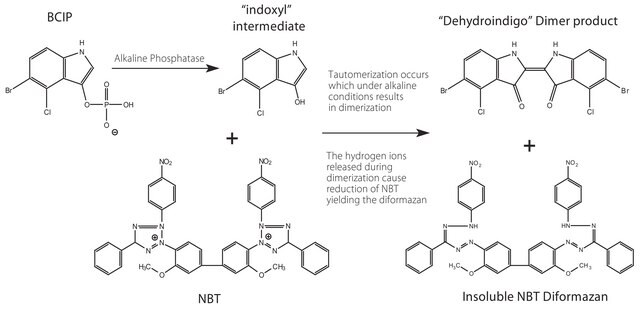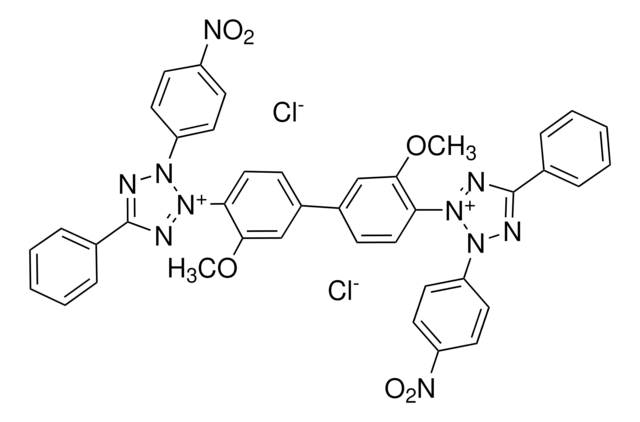11681460001
Roche
INT/BCIP Stock Solution
solution, pkg of 3 mL
Sinonimo/i:
5-bromo-4-chloro-3-indoyl phosphate, BCIP
Autenticatiper visualizzare i prezzi riservati alla tua organizzazione & contrattuali
About This Item
Codice UNSPSC:
12352204
Prodotti consigliati
Forma fisica
solution
PM
(INT: Mr = 505.7; BCIP toluidine salt: Mr = 433.6)
Confezionamento
pkg of 3 mL
Produttore/marchio commerciale
Roche
Temperatura di conservazione
2-8°C
Descrizione generale
BCIP (5-bromo-4-chloro-3-indoyl phosphate) is the AP (alkaline phosphatase)-substrate which after dephosphorylation reacts further to give a dark-blue indigo dye as an oxidation product. INT (iodonitrotetrazolium) is the oxidant producing a red dye. The reaction product has a reddish-brown color and is insoluble in water.
Applicazioni
INT/BCIP Stock Solution is used for the sensitive detection of alkaline phosphatase (AP) in blotting protocols, that includes:
- Southern blot
- Western blot
- immunohistochemistry and immunocytochemistry
Specifiche
Formulas: INT: C19H13CIN5O2; BCIP: C8H6NO4BrCIP x C7H9N
Principio
BCIP is the AP-substrate which after dephosphorylation reacts further to give a dark-blue indigo dye as an oxidation product. INT is the oxidant producing a red dye.
Stato fisico
Solution of 33 mg/ml INT (2-[4-iodophenyl]-3-[4-nitrophenyl]-5-phenyltetrazolium chloride) and 33 mg/ml BCIP (5-bromo-4-chloro-3-indolyl-phosphate, toluidine-salt in DMSO)
Nota sulla preparazione
Working solution: Preparation of 10 ml Staining Solution
Bring the stock solution to 15 to 25 °C until all components are dissolved.
Add 75 μl of the stock solution to 10 ml 0.1 M Tris-buffer, pH 9.5, 0.05 M MgCl2, 0.1 M NaCl.
Note: Prepare the staining solution shortly before use.
Preparation of Additional Solutions Required
Blocking solution: Dissolve 0.5 g Blocking Reagent in 100 ml TBS, pH 7.5, by heating to 50 to 60 °C (1 hour). Dissolving the components can be accelerated by sonication or by incubation in a microwave oven.
Information Note: The solution remains turbid.
Bring the stock solution to 15 to 25 °C until all components are dissolved.
Add 75 μl of the stock solution to 10 ml 0.1 M Tris-buffer, pH 9.5, 0.05 M MgCl2, 0.1 M NaCl.
Note: Prepare the staining solution shortly before use.
Preparation of Additional Solutions Required
Blocking solution: Dissolve 0.5 g Blocking Reagent in 100 ml TBS, pH 7.5, by heating to 50 to 60 °C (1 hour). Dissolving the components can be accelerated by sonication or by incubation in a microwave oven.
Information Note: The solution remains turbid.
Altre note
For life science research only. Not for use in diagnostic procedures.
Codice della classe di stoccaggio
12 - Non Combustible Liquids
Classe di pericolosità dell'acqua (WGK)
WGK 2
Punto d’infiammabilità (°F)
does not flash
Punto d’infiammabilità (°C)
does not flash
Certificati d'analisi (COA)
Cerca il Certificati d'analisi (COA) digitando il numero di lotto/batch corrispondente. I numeri di lotto o di batch sono stampati sull'etichetta dei prodotti dopo la parola ‘Lotto’ o ‘Batch’.
Possiedi già questo prodotto?
I documenti relativi ai prodotti acquistati recentemente sono disponibili nell’Archivio dei documenti.
I clienti hanno visto anche
Practical Methods in Cardiovascular Research
Dhein S
Springer Science & Business Media (2006)
Rahul Satija et al.
Nature biotechnology, 33(5), 495-502 (2015-04-14)
Spatial localization is a key determinant of cellular fate and behavior, but methods for spatially resolved, transcriptome-wide gene expression profiling across complex tissues are lacking. RNA staining methods assay only a small number of transcripts, whereas single-cell RNA-seq, which measures
Anna-Carina Weiss et al.
Development (Cambridge, England), 141(17), 3420-3430 (2014-08-21)
The vesico-ureteric junction (VUJ) forms through a complex developmental program that connects the primordium of the upper urinary tract [the nephric duct (ND)] with that of the lower urinary tract (the cloaca). The signals that orchestrate the various tissue interactions
Federico Tessadori et al.
eLife, 10 (2021-08-11)
Organ laterality refers to the left-right asymmetry in disposition and conformation of internal organs and is established during embryogenesis. The heart is the first organ to display visible left-right asymmetries through its left-sided positioning and rightward looping. Here, we present
Il team dei nostri ricercatori vanta grande esperienza in tutte le aree della ricerca quali Life Science, scienza dei materiali, sintesi chimica, cromatografia, discipline analitiche, ecc..
Contatta l'Assistenza Tecnica.
